Early Life ~~~
Named after his father, Marcus Mosiah Garvey was born on August 17, 1887, in St. Ann’s Bay, Jamaica, the youngest of eleven; however, only he and his sister, Indiana, lived to see adulthood. As a child he was well off, considering the time and circumstances. His father was a stonemason and his mother was a domestic worker and a farmer. Like many Jamaican peasants, he was able to acquire basic formal education, but he never did go to secondary school (he was privately tutored in some secondary school subjects). He did, however, make good use of his father’s personal library. It was from this lucky resource that he was able to learn about many different subjects. Even before dropping out of school, he began to learn a trade: At the age of fourteen, Marcus Garvey became a printer’s apprentice. This printer happened to be his godfather, Mr. Burrows. Like his father, his Godfather was also well-read and kept his own personal library, and Marcus used it well. Garvey was a quick learner, so he quickly mastered his new trade and, after a few years, left for Kingston, Jamaica. While there, he stayed with one of his maternal uncles and received a job at P.A. Benjamin’s Printery. It was not long before young Marcus began making a name for himself. At the age of eighteen, he was promoted to foreman—a job usually given to a Canadian or British import and certainly not to such a young man. After he established himself in Kingston, he sent for his mother. A hurricane in 1903 devastated her crops, so Marcus hoped to help his mother recover from such a devastating loss by moving her to the city. Unfortunately, she did not like it there and died less than two years later.
Beginning of Social Activism ~~~
Marcus, however, loved the city. Although he thought St. Ann’s Bay was beautiful and stating that he “grew with nature and drank much of her inspiration,” the city was filled with people who had knowledge of worldly affairs and spare time to engage in clubs and other activities. Naturally, with the higher population and a corporate job, he soon met a group of people with similar interests. Soon he became involved in social and community work, so when the printers formed a union (one of the earliest trade unions in the British Caribbean) he promptly joined as well. Not long after the formation of the Printers Union, they called a strike. As a foreman, Marcus was promised favorable treatment if he did not join, but he chose to side with the common printer and became their leader. Together they agitated for better wages and garnered support from U.S. Printers, but one person ran off with the money—forcing the men to return to work. So all in all, the strike failed and he lost his job, but—as he was the youngest foreman in Kingston—he was able to get another job with the Government Printery.

